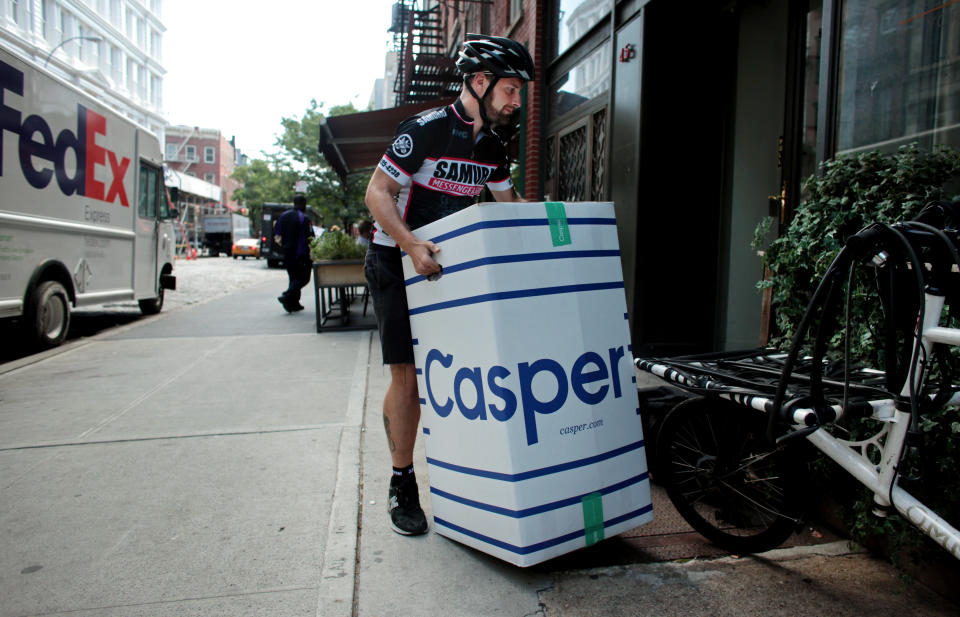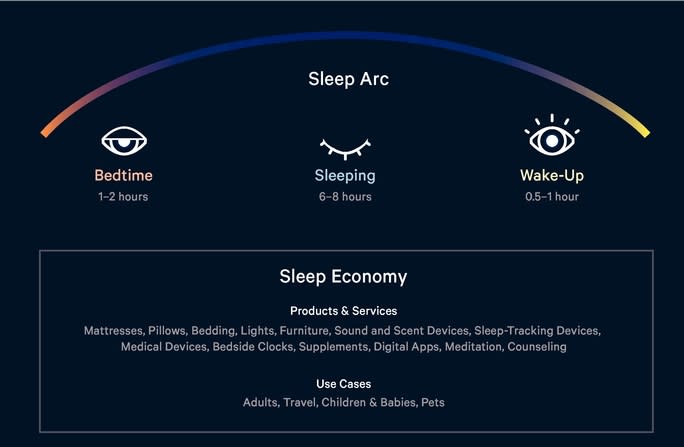Investors beware: Casper's IPO filing looks a lot like Peloton's
Casper is an online startup founded in 2014 that sells mattresses and bedding. Full stop.
But according to the company’s S-1 filing on Friday to go public, Casper is so much more than that: It’s a “pioneer of the Sleep Economy,” a term which appears 59 times in the filing. Casper says the “Sleep Economy” was $432 billion in size in 2019, according to research firm Frost & Sullivan. Casper “innovates throughout the Sleep Economy.”
It also lost $92.1 million in 2018 on $358 million in revenue. In 2019, it lost $80 million on returns, refunds, or discounts. And it’s burned through $422.8 million in marketing in the last three years.
Yet the company has a valuation of $1.1 billion.

Unique risks and big competition
Casper highlights its “compelling experiences with customers making repeat purchases,” but the Wall Street Journal in December highlighted how easily the free trials offered by Casper and others can be abused.
Under Casper’s risk factors, there’s some of the boilerplate unicorn fare (“We have a history of losses and expect to have operating losses and negative cash flow as we continue to expand our business”) but also a warning about the much-ballyhooed Sleep Economy (“The market for sleep as a retail category is still emerging and if it does not continue to grow... our brand, business, financial condition, or results could be adversely affected”) and a warning about its use of influencers: “Use of social media and influencers may materially and adversely affect our reputation or subject us to fines or other penalties”).
And under competition, Casper says it competes with “legacy mattress manufacturers” like Serta Simmons and Sleep Number, plus fellow direct-to-consumer startups like Purple (which is public), Leesa, and Brooklinen. (And there are dozens more that Casper doesn’t name.) But since Casper also sells “soft goods,” it says it also competes with Walmart, Bed Bath & Beyond, Bloomingdale’s, Macy’s, Ralph Lauren, and Martha Stewart. And since Casper also sells “bedroom furniture” it says it also competes with Ikea, Pottery Barn, West Elm, Amazon, Wayfair, and Overstock. Are there any retailers left that aren’t competitors?
Unicorn hype and “Oprah-speak”
So Casper loses money and its losses last year accelerated; it’s competing with an extensive list of retailers including behemoths like Amazon; and it’s spending a lot on marketing to millennials.
That sounds a lot like the conclusions from Peloton’s S-1 filing last August.

Peloton sells exercise bikes and treadmills, but in its S-1 filing, CEO John Foley said Peloton “sells happiness.” (Casper, similarly, says it is ““making shopping for sleep joyful.”) Peloton’s filing also defined Peloton as a “technology company... a media company... an interactive software company... a product design company... a social connection company... a direct-to-consumer, multi-channel retail company... an apparel company... a logistics company.”
It’s “Oprah-speak,” as Fortune noted, and it’s commonplace now in unicorn IPO marketing. (Ironically, Casper says its product portfolio “avoids jargon,” in an S-1 form that is full of jargon.)
Peloton, like Casper, is not profitable, and its losses are accelerating, not decelerating. It also, like Casper, disclosed unique risk factors in its S-1, such as access to music licensing rights. And the more recent backlash to Peloton’s TV commercial—in which a woman receives a Peloton bike from her husband and then chronicles her joyful use of the bike in a homemade video she makes him watch—might be a sign that the public is at last wisening up to the myth of tech startups that think they are changing lives and saving the world.
Or not. Casper’s flowery S-1 filing doesn’t mean its IPO won’t be a success. If potential investors buy Casper’s claims about the growth potential of the “Sleep Economy” and Casper’s product offerings across the “Sleep Arc,” or are impressed by stats like Casper’s 20% repeat customer rate, they may gobble up shares in the offering.
But if unicorn IPOs in 2020 look anything like unicorn IPOs in 2019, it will be ugly for this money-losing mattress seller. Peloton (PTON), four months after its debut, is trading at its IPO price (and Peloton at least has recurring subscription revenue, which Casper does not.) Slack (WORK) is down 13%, Uber (UBER) is down 23% from its IPO price, Lyft (LYFT) is down 34%.
—
Daniel Roberts is a senior writer and show host at Yahoo Finance. Follow him on Twitter at @readDanwrite.
What really fueled the 2019 unicorn IPO funeral
Uber, Lyft stock performance shows 'appetite for risk has diminished'
Netflix stock is vulnerable in a recession, Nomura says
Meet the ‘phoenix’ stocks: Zoom, MongoDB, PagerDuty and more
How Eventbrite’s horrible stock performance is hurting Square
